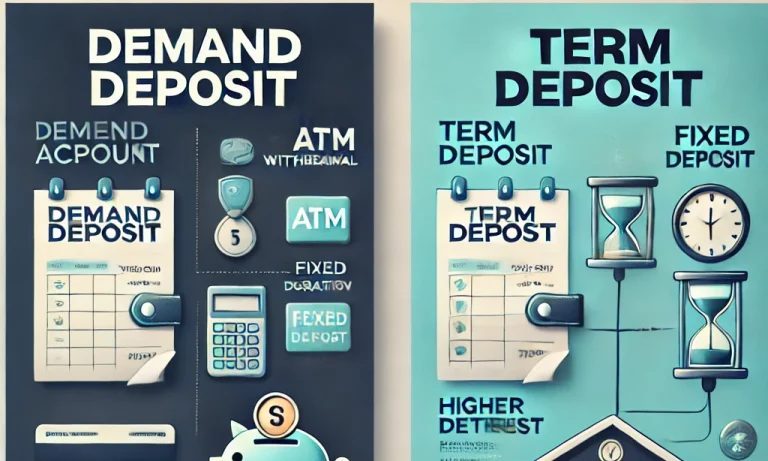The difference between demand deposit and term deposit lies in their purpose, liquidity, and returns. Demand deposits, by the nature of their names, serve to fulfill daily requirements, thus available on demand. Term deposits instead require funds to be placed there for specified periods in return for slightly higher interest rates instead of diminished liquidity. The two types of deposits thus meet different goals in finance – one prioritizing ease of access and the other the growth of savings.
What is Demand Deposit?
Demand deposits refer to money held in a bank account that can be drawn from at any time without notice being provided in advance. They are mainly used for everyday operations and money is easily available from ATMs, checks, or online accounts.
Key Features of Demand Deposits
Demand deposits are highly liquid and cater to individuals and businesses that need funds readily available for day-to-day expenses.
- Instant Access: Funds can be accessed at any time, making them ideal for meeting daily financial requirements.
- Minimal Interest Rates: Demand deposits offer little to no interest since their primary focus is on liquidity rather than returns.
- Facilitate Transactions: These accounts are used for paying bills, transferring money, and other routine financial activities.
Types of Demand Deposits
Demand deposits are vital financial instruments, allowing account holders to access their funds on demand with minimal restrictions. Two primary forms:
- Savings Accounts: The savings accounts cater to individuals, offering limited withdrawals and a nominal interest rate.
- Current Accounts: Designed for businesses, these accounts allow unlimited transactions but generally do not offer any interest.
What is Term Deposit?
Term deposits are bank accounts into which funds are deposited for a specified term, earning higher interest rates in return for restricted accessibility. They are ideal for both individuals and firms seeking to securely save money while earning guaranteed returns.
Key Features of Term Deposits
Term deposits offer a considerably high rate and are used for long-term savings and investments.
- Fixed Tenure: Funds are tied up for a specified period, anywhere from a few months to several years.
- Higher Interest Rates: Term deposits offer much higher returns than demand deposits since an individual commits to letting the funds sit idle throughout the term.
- Penalty charge for a withdrawal call before maturity: The funds would incur a penalty charge that reduces interest earned, and the principal amount in extreme cases.
Types of Term Deposits
Term deposits are the safest investment tools, allowing for certain returns over a fixed tenure. Popular types include Fixed Deposits (FDs) and Recurring Deposits (RDs), which cater to varied saving preferences.
- Fixed Deposits (FDs): A lump sum amount is deposited for a fixed term, with interest paid at maturity or periodically.
- Recurring Deposits (RDs): Depositors contribute small amounts regularly over a fixed period, earning interest on the cumulative amount.
Differences Between Demand Deposit & Term Deposit
Demand deposits and term deposits serve different financial purposes. Below is a detailed comparison of their key differences:
Accessibility of Funds
- Demand Deposit: Demand deposits allow direct access to one’s funds on short notice and are highly liquid, perfect for daily financial transactions. These accounts may be drawn against through ATMs, checks, e-banking, electronic transfers, or even at the bank itself without penalty.
- Term Deposit: Term deposits prohibit access to these funds for some predetermined number of months, such as six months, one year, or five years. As these offer the highest interest rates, the money cannot be withdrawn until the term ends (matures) without a penalty.
Interest Rates
- Demand Deposit: Demand deposits offer low or no interest since their purpose is liquidity rather than investment growth. Savings accounts are a prime example of small interest rates, while current accounts may not even offer any interest. The very low returns on demand deposits reflect their role as a convenience for managing routine financial transactions.
- Term Deposit: Term deposits offer much higher interest rates than demand deposits. For this reason, the money is locked into the bank for a certain time, allowing it to invest in other ventures. The longer the term, the higher the interest rate, so term deposits are a popular choice for anyone or business wanting to earn steady and risk-free returns.
Purpose
- Demand Deposit: Demand deposits are designed for managing daily transactions, cash flows, and short-term financial needs. They are commonly used by individuals for personal expenses and by businesses for operational purposes, such as paying suppliers or managing employee salaries. The flexibility and ease of use make demand deposits essential for smooth financial management.
- Term Deposit: Term deposits, in contrast, are focused on savings and earning higher returns. They are ideal for individuals and businesses with surplus funds who want to invest in a secure, low-risk option to achieve long-term financial goals.
Tenure & Flexibility
- Demand Deposit: Demand deposits have no fixed tenure and remain operational indefinitely, as long as the account holder maintains the required minimum balance (if applicable). This flexibility allows users to make deposits and withdrawals as needed, ensuring uninterrupted access to their funds.
- Term Deposit: Term deposits have a defined tenure, agreed upon at the time of opening the account. The duration can range from a few months to several years, depending on the depositor’s preferences and the bank’s offerings. While funds are locked in during this period, the fixed nature of term deposits ensures steady returns.
Penalty for Early Withdrawal
- Demand Deposit: The withdrawals on a demand deposit have no exercise of a penalty and, therefore, remain highly flexible for a holder. Customers can withdraw funds through ATMs, mobile banking, or over the counter without exercising any particular cost.
- Term Deposit: Term deposits also carry some penalty for withdrawing the funds early. Penalties may include a reduction in the earned interest or a nominal withdrawal charge. It is this penalty that deters premature access to the funds.
| Aspect | Demand Deposit | Term Deposit |
| Accessibility of Funds | Highly liquid; funds accessible anytime through ATMs, checks, e-banking, or at the bank. | Funds locked for a fixed term; early withdrawal incurs penalties. |
| Interest Rates | Low or no interest; focuses on liquidity (e.g., savings or current accounts). | Higher interest rates; rewards for locking funds over a defined term. |
| Purpose | For daily transactions and short-term financial needs (personal expenses, operational use). | For savings and earning secure, risk-free returns on surplus funds. |
| Tenure & Flexibility | No fixed tenure; operational indefinitely with a required balance maintained. | Fixed tenure ranging from months to years; ensures steady returns. |
| Penalty for Early Withdrawal | No penalties for withdrawals; highly flexible. | Early withdrawal incurs penalties such as reduced interest or nominal charges. |
Conclusion
Demand deposit and term deposit differ in their liquidity, purpose, and returns. Demand deposit prioritizes accessibility over the rest, while it may not be the best deposit for daily financial needs. Term deposits are for higher returns and hence for goals of long-term savings. Knowing these differences between the two allows an individual or business to make the right choice in choosing the type of deposit to fit their financial priorities and needs. Combining the best of both can achieve balance in increasing liquidity and growth of finance.
Demand Deposit vs Term Deposit FAQs
What is a demand deposit?
A demand deposit is an account that one opens in the bank where he/she can withdraw money at any time without any restrictions on withdrawals; for example, savings and current accounts.
What is a term deposit?
A term deposit is an account where money is locked for some period while it earns a higher interest rate.
Which one gives better return: Demand deposit or Term deposit?
Term deposits give good returns due to high interest rates compared to demand deposits.
Can I withdraw the money from the term deposit before maturity?
Yes. Although normally there is a penalty on such early withdrawal, this indeed reduces the total interest reaped.
Are term deposits safe?
Term deposits are one of the safest investments around since they provide guaranteed returns with minimal risks.


